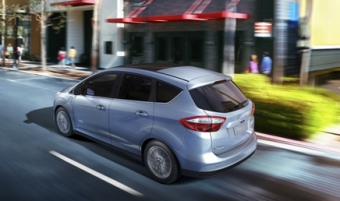
Automotive Intelligence - the web for automotive professionals and car enthusiasts
October 25, 2012
This Week:
-
World premiere of the Volkswagen “Taigun” concept at the São Paulo International Motor Show
-
World premiere of the SLS AMG GT3 "45th ANNIVERSARY" at the 2012 São Paulo International Motor Show
© 1998 - 2012
Copyright &
Disclaimer
Automotive Intelligence,
www.autointell.com
All Rights Reserved .
For questions please contact
editor@autointell.net
|
Ford C-MAX Energi Plug-in Hybrid Qualifies for California Carpool Lane Access and Incentives Up to $5,250
SACRAMENTO, Calif. – Californians looking to avoid near $5-per-gallon gas will soon be able to buy the C-MAX Energi plug-in hybrid, potentially save $5,250 off the purchase price and enjoy high-occupancy vehicle lane (HOV) access. The C-MAX Energi was just approved for the Green Clean Air Vehicle Sticker as part of the Clean Vehicle Rebate Program (CVRP). California C-MAX Energi customers can now apply to receive a $1,500 state tax rebate when purchasing or leasing the vehicle for 36 months or longer. In addition to the state rebate, C-MAX Energi will qualify for the existing $3,750 federal tax credit – making America’s most affordable plug-in hybrid even more affordable for Californians at $28,495 after the federal tax credit and state tax rebate. The approval also paves the way for the C-MAX Energi to be approved in other states with carpool lane plug-in vehicle incentives, such as Maryland, New York and Virginia. |
|
|
|
“We’re pleased with California customers’ early interest in the C-MAX hybrids, our first dedicated hybrid-only nameplate in North America, in the No. 1 hybrid market in the U.S.,” said Michael O’Brien, Ford electrified vehicle marketing manager. “The C-MAX Energi is the most affordable, most fuel-efficient plug-in hybrid with the longest overall range for any utility or compact vehicle on the market today – this extra carpool lane incentive and rebate will help Californians go further with Ford in every sense of the phrase.” |
|
The C-MAX Energi achieves up to 21 miles in all-electric range – more than triple Toyota Prius plug-in hybrid’s six-mile all-electric range. This means that at least one leg of the average work commute – reportedly 20 miles each way – could be completed each day on electric battery charge only, allowing customers to save gas as they face traffic congestion in their commute. A study by the United States Department of the Treasury estimates congestion consumed an extra 1.9 billion gallons of fuel in 2011, approximately 5 percent of all gasoline used. CVRP is funded by the California Environmental Protection Agency’s Air Resources Board (CARB) and administered statewide by the California Center for Sustainable Energy (http://energycenter.org/index.php/incentive-programs/clean-vehicle-rebate-project). According to CARB, Green Clean Air Vehicle Stickers are available to the first 40,000 applicants who purchase or lease cars meeting California's Enhanced Advanced Technology Partial Zero Emission Vehicle (AT PZEV) requirement. Access to HOV lanes, plus the C-MAX Energi’s combination of fuel-efficient highway driving and electric-powered city driving is more important than ever with the growing trend of commuters spending more time on the roads. A recent study from New York University’s Rudin School of Transportation shows today’s commuters are on the road longer than ever before, and the number of people who commute more than 90 miles to work has doubled over the past 10 years. The all-new Ford C-MAX Energi is America’s most fuel-efficient plug-in hybrid with an EPA-certified 108 miles-per-gallon equivalent (MPGe) city rating, 92 MPGe highway rating and 100 MPGe combined rating. |
|
Power of Choice
C-MAX Energi figures prominently in Ford’s rollout of electrified vehicles. Ford’s other electrified vehicles include:
•Focus Electric: Production began late 2011; America’s most fuel-efficient compact with 110 MPGe city and 105 MPGe combined – 6 MPGe better than the Nissan Leaf
•C-MAX Hybrid delivers EPA certified 47 mpg city, 47 mpg highway ratings – 7 mpg better than the Toyota Prius v on the highway – for a 47 mpg combined rating
•All-new Fusion Hybrid is America’s most fuel-efficient midsize sedan after being certified by the EPA to deliver 47 mpg city, 47 mpg highway, 47 mpg combined. This beats the Toyota Camry Hybrid by 8 mpg highway, 4 mpg city
•Fusion Energi plug-in hybrid: Will begin production by the end of this year; aiming to be the most fuel-efficient midsize car in the world with more than 100 MPGe
Photo: Ford
(Oct. 23, 2012)
